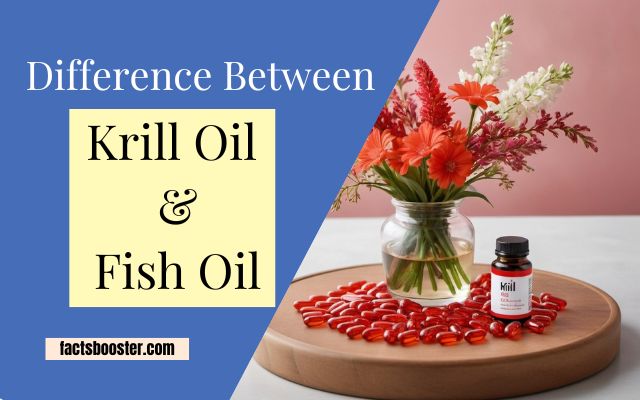Omega-3 supplements have soared in popularity, sparking debates on the difference between krill oil and fish oil. This comparison will delve into krill oil benefits, fish oil benefits, and aspects like sustainability and side effects, providing you with the insights needed to select the optimal supplement for your health.
Key Takeaways:
- Krill oil vs fish oil absorption: Krill oil, with its unique phospholipid structure, might offer better absorption compared to fish oil.
- Sustainable omega-3 sources: The environmental impact and sustainability practices surrounding krill and fish harvesting are critical considerations.
- Krill oil side effects: While both supplements are lauded for their health benefits, potential side effects and risks should be understood.
What is Krill Oil
Krill oil had its origins in the tiny, yet potent Antarctic krill. These small crustaceans harbor omega-3 fatty acids, pivotal for our well-being. Unlike its counterpart, krill oil boasts of EPA and DHA, essential components for optimal health.
A distinct advantage emerged from its composition; these omega-3s are in phospholipid form. This characteristic had led some to believe krill oil might offer superior absorption when compared to other sources.
Moreover, it is rich in astaxanthin, a potent antioxidant not typically found in fish oil. This combination of features makes krill oil a noteworthy contender in the domain of omega-3 supplements, offering unique benefits beyond the standard.

What is Fish Oil
Fish oil, widely recognized for its health benefits, originates from the tissues of oily fish such as anchovies, mackerel, and salmon. This supplement is celebrated for its rich content of omega-3 fatty acids, specifically EPA and DHA.
Over the years, it has surged in popularity, becoming one of the most commonly embraced dietary supplements globally. These Omega-3 supplements have been harnessed for their potential in supporting heart health, reducing inflammation, and improving cognitive function.
The accessibility and affordability of fish oil render it a preferred choice for many seeking to amplify their intake of these crucial nutrients. Advocates for a healthy lifestyle frequently endorse it, underscoring the supplement’s reputed efficacy in fostering overall well-being.
Thus, fish oil stands as a cornerstone in the quest for enhanced health through nutritional supplementation.
Read more:
Nutrient Comparison
Here is a detailed comparison table for krill oil and fish oil based on omega-3 levels, bioavailability, and antioxidant content:
| Comparison Aspect | Krill Oil | Fish Oil |
| Omega-3 Levels | Contains EPA and DHA, generally lower total omega-3 content but higher absorption rate | Contains EPA and DHA, generally higher total omega-3 content |
| Bioavailability | Omega-3s in the form of phospholipids, which are more easily absorbed by the body | Omega-3s in the form of triglycerides, which require conversion before absorption |
| Antioxidant Content | Contains astaxanthin, a powerful natural antioxidant | Typically does not contain astaxanthin |
Difference Between Krill Oil and Fish Oil
The essence of the matter lies in the omega-3 composition, where both krill and fish oils emerge as crucial sources. Yet, it is the krill oil that boasts of containing EPA and DHA in a structurally distinct phospholipid form.
This uniqueness potentially facilitates a superior absorption rate compared to the triglyceride form found in fish oil. Beyond just omega-3s, krill oil distinguishes itself by possessing astaxanthin, a potent antioxidant absent in its counterpart.
This substance contributes to the antioxidant properties of krill oil and might also play a role in its enhanced efficacy regarding heart health and inflammation reduction.
Cost and accessibility factors further complicate the debate. Fish oil, acclaimed for its benefits including heart health improvement, is notably more accessible and less expensive than krill oil.
Despite its potential advantages such as better absorption and additional antioxidants, the latter often comes with a higher price tag and might not be as readily available.
Thus, choosing between krill oil and fish oil hinges on weighing these critical differences against personal health goals and budgetary constraints.
Cardiovascular Health: Krill Oil vs. Fish Oil
Investigations have shed light on the sustainable omega-3 sources found in krill oil and fish oil, revealing their pivotal roles in promoting heart health. In the realm of cardiovascular benefits, krill oil, brimming with EPA and DHA, steps forward as a possibly superior option. (1)
Studies highlighted that krill oil, enriched with these fatty acids and the antioxidant astaxanthin, could enhance the body’s lipid profile more markedly than its counterpart.
Nevertheless, fish oil is not without its merits. Esteemed for its copious omega-3 content, it has been proven to offer significant protection against heart disease. The difference between krill oil and fish oil absorption lies in the former’s structure; krill oil’s phospholipid-based omega-3s might be more readily assimilated by our bodies.
This factor, coupled with astaxanthin’s presence, ostensibly gives krill oil an edge in mitigating cardiovascular risk factors. Still, given the variability of individual responses, one might argue that both supplements present viable paths to heart health.
Inflammation and Joint Health: Krill Oil vs. Fish Oil
Research has delved into the effects of both krong>krill oil and fish oil on inflammation and joint health. These omega-3 supplements have been scrutinized for their potential to alleviate such conditions.
Krill oil, abundant in EPA and DHA, includes phospholipids that may enhance its absorption and effectiveness. This feature is thought to potentiate its anti-inflammatory actions, directly benefiting joint health.
Conversely, fish oil, a staple in the realm of dietary supplements, has been credited with similar benefits. Its high omega-3 fatty acid content has shown promise in reducing inflammation. (2)
However, a distinguishing factor is krill oil’s astaxanthin content, an antioxidant that offers added anti-inflammatory properties, potentially giving it an edge over fish oil in this regard. Yet, rigorous comparative studies are scarce, leaving room for further research to delineate the definitive advantages of one over the other.
Despite this, both oils represent viable options for addressing inflammation and joint health, embodying a testament to the therapeutic prowess of omega-3 fatty acids.
Read more:
Brain Health and Cognitive Function: Krill Oil vs. Fish Oil
Omega-3 supplements, specifically DHA and EPA, have been linked to various benefits for brain health and cognitive function. Studies revealed that these fatty acids play crucial roles in maintaining neuronal structure and function. They were hailed for their potential to improve memory and reduce cognitive decline.
Research comparing krill oil and fish oil suggests a competitive edge for krill oil due to its phospholipid-bound form of omega-3s.
This unique structure might facilitate more efficient passage through the blood-brain barrier, enhancing the distribution of these essential nutrients to the brain. Krill oil also boasts the presence of astaxanthin, a potent antioxidant that could provide additional neuroprotective benefits. (3)
Despite these promising attributes, definitive conclusions remained elusive. Sufficient evidence supporting the superiority of krill oil over fish oil in promoting brain health hasn’t been solidified in the scientific community.
Both oils continued to be celebrated for their rich omega-3 content, making them valuable components of a healthful diet. Consumers searching for sustainable omega-3 sources could consider either option, with a mindful evaluation of krill oil vs fish oil absorption rates, potential side effects, and environmental impacts guiding their choice.
Other Health Benefits: Skin Health, Eye Health, etc.
Omega-3 supplements, whether from krill oil or fish oil, offer more than heart benefits alone. Skin health can significantly improve from these fatty acids. Users have reported enhanced skin hydration and a decrease in acne.
Eye health also benefits from omega-3s, with a reduced risk of age-related macular degeneration documented in several studies. Omega-3 fatty acids are integral for maintaining fluidity in the cell membranes, leading to healthier skin cells and possibly better vision.
Krill oil, with its astaxanthin, brings an additional antioxidant defense, making it slightly superior for protecting skin from UV-induced damage. However, it’s the combined DHA and EPA content in both oils that primarily aids eye health. In summary, each supplement has its niche:
- Krill oil benefits include potentially better skin protection due to astaxanthin.
- Fish oil benefits are more aligned with affordability and accessibility while still supporting skin and eye health.
Despite these differences, consulting a healthcare provider before starting any new supplement regimen ensures a safe and informed choice tailored to your specific health needs.
Environmental Impact and Sustainability
The quest for sustainable omega-3 sources has cast a spotlight on the environmental impact of harvesting krill and fish for their oils. Krill, tiny crustaceans vital to the Antarctic ecosystem, are harvested for krill oil, rich in EPA, DHA, and the antioxidant astaxanthin. The fishing industry, targeting fatty fish like anchovies and salmon for fish oil, faces scrutiny for its practices as well.
Certifications and initiatives aim to mitigate these concerns. The Marine Stewardship Council (MSC) certifies fisheries that adhere to sustainable fishing practices, a badge of honor among krill oil producers.
Fish oil suppliers, on the other hand, often highlight their adherence to regulations aiming to reduce overfishing and environmental damage. These efforts intend to balance the demand for omega-3 supplements with the need to protect marine ecosystems.
Yet, the debate on krill oil vs fish oil sustainability is ongoing. Krill oil extraction, despite certifications, still raises questions about long-term impacts on Antarctic food chains. Fish oil’s broader accessibility and affordability come with concerns over maritime sustainability.
As we navigate these waters, consumer awareness and demand for responsibly sourced products could shape a more sustainable future for omega-3 supplementation.
Potential Side Effects and Risks (Explain in bullet form)
Exploring the omega-3 supplements landscape reveals the popularity of krill oil and fish oil. Both offer significant health benefits, yet they come with their own sets of potential side effects and risks. Understanding these can help you make an informed decision on which supplement suits you better, especially if you have concerns about krill oil side effects or those related to fish oil.
- Digestive Discomfort: Users might experience bloating, diarrhea, or indigestion. These are common when your body adjusts to either supplement.
- Fishy Aftertaste: A notable complaint with fish oil is its lingering, unpleasant taste. Krill oil, while less complained about, can sometimes cause a similar issue.
- Interaction with Blood-Thinning Medications: Both oils might amplify the effects of these medications, raising the risk of bleeding.
- Allergic Reactions: Those with shellfish allergies should approach krill oil with caution. Similarly, fish oil could trigger reactions in individuals allergic to fish.
- Heavy Metal Contamination: Fish oil risks include potential contamination with heavy metals like mercury, though many supplements are purified and tested for safety.
- Impact on Blood Sugar Levels: Initial research hinted at the possibility that these supplements could affect blood sugar control, a concern still under investigation.
Careful consideration of these side effects and risks ensures that you choose a supplement that not only meets your health needs but also aligns with your dietary restrictions and medical history.
Conclusion
In the debate between krill oil and fish oil, both emerge as potent sources of omega-3 fatty acids, crucial for optimal health. Krill oil, rich in EPA and DHA, might offer better absorption and additional antioxidant benefits thanks to astaxanthin, not found in fish oil.
Meanwhile, fish oil benefits from being more accessible and cost-effective, making it a popular choice for those seeking omega-3 supplementation. While some evidence hints at krill oil’s superiority in enhancing cardiovascular health, the choice between krill oil and fish oil hinges on individual needs, preferences, and financial considerations.
Importantly, whether you lean towards krill oil benefits for their unique properties or fish oil benefits for their proven impact, consulting a healthcare professional before embarking on any new supplement regimen ensures safety and efficacy tailored to your health profile.


